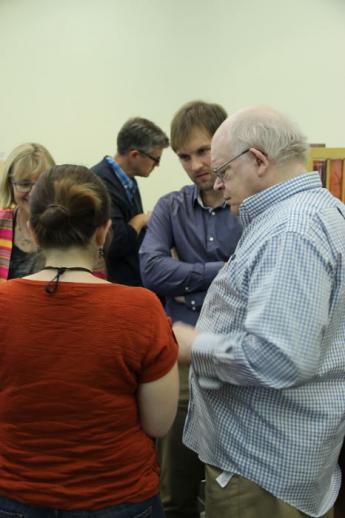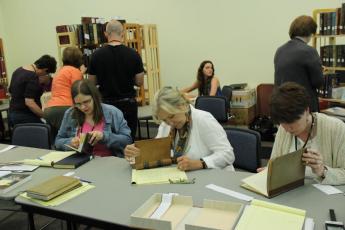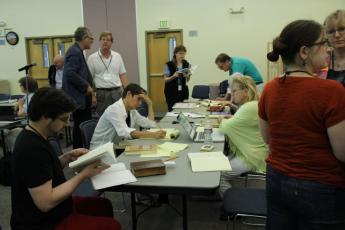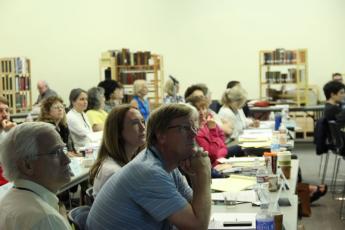News & Updates The Australian and New Zealand Association of Antiquarian Booksellers Asia Bookroom
CABS: or seeing the book trade with clarity
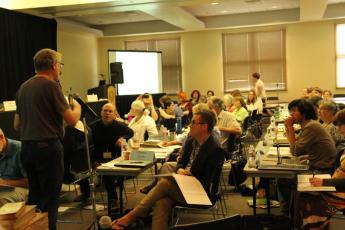
By Sally Burdon
A week at the Colorado Rare Book Seminar is a week like no other I know. It is a highly practical week, it is an inspiring week and it is one of those weeks when, at least metaphorically, you feel you can see for miles. I felt as though I was standing, together with everyone else who attended, on a hill above the plain of bookselling. This hill on which we stood together had a view so good that the trade was fully revealed and clarified. The strengths and weaknesses of the trade were shown with coherence something that is very difficult, if not impossible to achieve in the day to day, month to month rush of the ordinary bookselling business.
So what is this extraordinary event that can so clearly reveal a trade so individual and diverse as the antiquarian booktrade? CABS, as the Colorado Rare Book Seminar is known, is a week of lectures, practical work, talk about the business and socialising. For the last 36 years CABS has delivered extraordinary “insider” information to interested booksellers, would-be booksellers, rare book and special collections librarians and collectors. Over this period over 2000 students have attended and many students are still working in the trade today, indeed some are very prominent members of the trade.
The idea behind what has evolved into today’s CABS was conceived by Dean Margaret Goggin of the Graduate School of Librarianship and Information Management at the University of Denver and Jacob L. Chernofsky, editor and publisher of AB Bookman’s Weekly. The aim was to redress the lack of awareness that booksellers and librarians had of each other’s problems, procedures and methods. There was an immediate and strong interest. Students enrolled – some years too many and there were waiting lists! Although the focus of CABS is nowadays more on the book trade itself, librarians and collectors still attend and report gaining much by doing so. Many of the lectures, such as those on binding or bibliography would be of interest to anyone with an interest in books and associated materials on paper. In fact even those on subjects that are very much a part of the book trade such as evaluating books and pricing and selling receive good feedback from the non- bookselling students. For anyone interested in books everything CABS offers is worthwhile and lectures such as these, while not of course directly applicable to their daily lives, enables these non-bookseller students to have a clearer understanding of the forces in the market.
I have heard CABS likened to a boot camp for booksellers and in a loose sense of the term it is. It is one of those periods in your life in which time both flies by and yet you feel every minute is etched on your mind. To say it is intense would surely be an understatement. Much is required of students and faculty. Every lecture is packed with information, every person you talk to has a book trade story to tell, a vision to share and a deep desire to learn more – and you meet a lot of people. And, I mean, every person there – the students, the faculty and faculty support as well. The more I have learned to know what CABS is and what it offers, the more I marvel over it! I will not go over exactly what lectures are given and what subjects are covered as a quick visit to the CABS website will give you a better idea than I can. What the website can’t really tell you though, and I am also struggling to do so here, is the concentration, involvement, genuinely interested attitude that everyone involved brings to it. It is exhilarating!
I wondered, before I first came in my role of specialist speaker last year, where the students would come from? Would they be young people or retirees considering a career change? Would they be employees of established firms or those seeking to begin a new business? Would they be booksellers with some years behind them in the trade or would they be entirely new to the trade? I found the student body to include all of these groups as well as many librarians and collectors. There were booksellers with 20 plus years of experience who were going through a time in their bookselling career when they felt stale and it was all too hard, and there were others unsure whether or not to take the plunge into the trade at all – and there were very many somewhere between them in experience. How would this work? Very well it turned out. The lectures assume little while simultaneously offering plenty to those who have been trading for years. I have been in trade full time since 1982 and I continue to learn a great deal! The lecturers work very hard on their presentations, they deliver with honesty, humour and engagement. They invite comments and questions and engage in discussion in front of the students, making it clear that there is, of course, no one way to run a book business. Students often comment how useful this back and forth of ideas is for them when thinking in terms of their own situation.
It is such a privilege to be part of a trade that is not frightened to share its methods and ideas. I wonder how many other people would get together and talk so freely about the methods used within their businesses and their ideas? I suspect not many, if any, and yet far from detracting from the market for those already dealing as some critics have feared, quite the contrary, there are plenty of students who have gone on to be very good dealers in their own right. These CABS graduates become admirable members of the trade, buying and selling within the trade as well as the community in general, attending book fairs, joining their national association and through ethical and informed dealing ensuring the best traditions of the trade continue and flourish.
The 36th session of CABS was completed on August the 8th, 2014. This year there were nearly 50 students enrolled. This year the faculty of 9 presented 30 sessions over 5 days – 5 very intensive, packed days! What students learn is of immediate and practical use. CABS is designed to support and encourage students while making sure they are under no illusions that this trade is not easy to make a living in, nor is it easy to run a long term viable business in, but and this is an important but, it is possible, very possible to do.
The foresight and understanding of the need for such a practical school is remarkable and that it has continued, and indeed is thriving, in a climate in which the book business has taken some blows is a huge credit to director Rob Rulon-Miller and the members of the faculty Lorne Bair, Terry Belanger, Dan De Simone, Dan Gregory, Nina Musinsky and Steven Smith. The most recent faculty member Brian Cassidy is living proof that CABS inspires and informs those who come to it. He is in the interesting situation of having graduated from CABS as a student 10 years ago and now, having made quite an impact in the trade, he is back, but this time as a member of the faculty. Just as Brian does, each member of the faculty brings something particular to the week. As a relatively new member of the faculty myself I find it is fun and humbling to work alongside my CABS colleagues. I learn so much both from them and the students.
What I have written here, though accurate, does not begin to come close to really reporting on what CABS gives those involved with it. Want some proof of the power of CABS? Read CABS 2014 graduate Rachel Jagareski’s blog or take a look at the York Antiquarian Book Seminar (YABS), the new UK antiquarian book school which was inspired by CABS. YABS was born after energetic British book seller and ABA member, Anthony Smithson attended CABS in 2012. He clearly saw the contribution CABS was making and was determined to bring this gift to the booksellers of the UK. With the support of the ABA and PBFA and a huge amount of work this gift will be delivered for this first time to the booksellers, collectors and librarians of Britain from September 15 to 17, 2014.
Although I invite you to read more about CABS through the many positive pieces such as Rachel Jagareski’s that have been written, I have a strong suspicion that the only way you can really understand what CABS gives to the world of books is to experience it. So, if I have piqued your interest, make sure to block out in your diary for July 12 – 17, 2015 when the 2015 Colorado Antiquarian Book Seminar will be held in Colorado Springs. It is only a week but it offers so much knowledge, so much experience, that it is highly likely it will alter your life.
Save the date!
Colorado Antiquarian Bookseminar, 12-17 July 2015!
***
(Pictures: Maria Lin)
